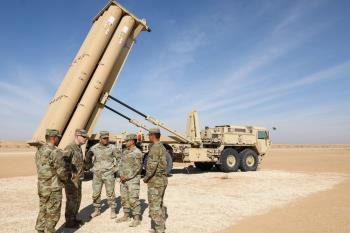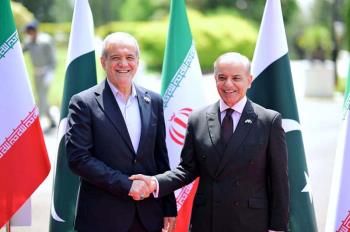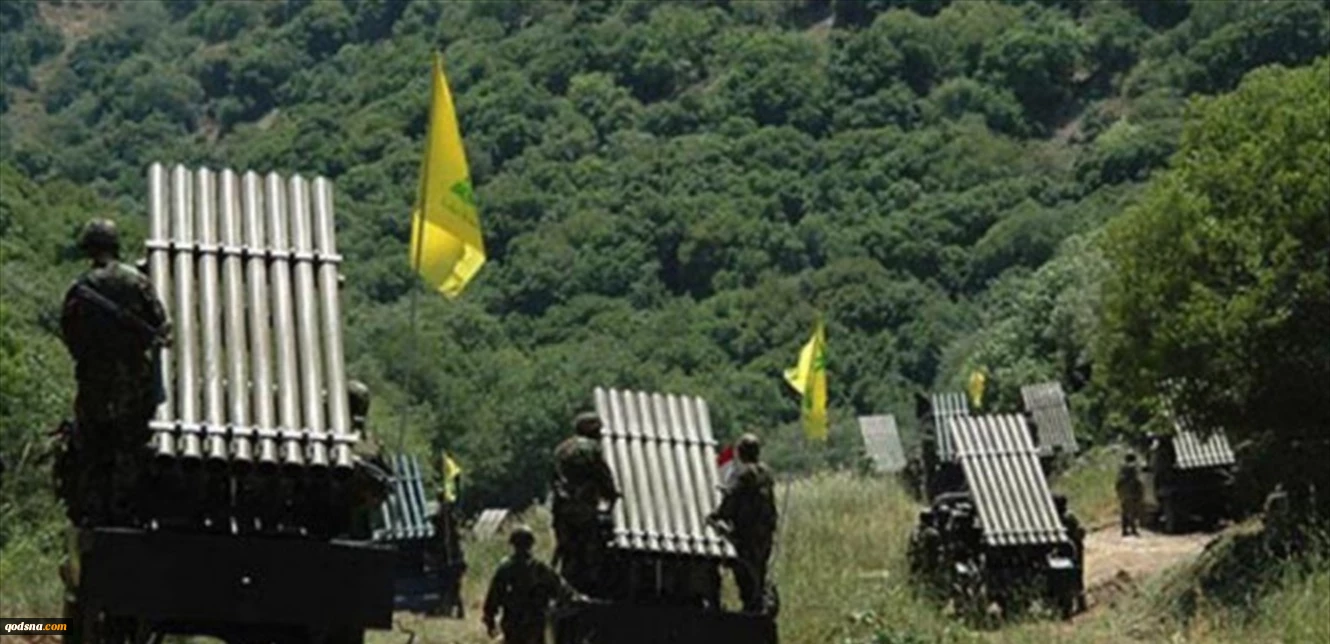Alwaght- As Israeli security challenges in the region increase, the US is pushing to remove one of the main obsessions of this regime in Lebanon. This aim has sharply upped the political pressures of the American diplomats in Beirut on the Lebanese officials. However, the White House has so far gone nowhere and Hezbollah with its prudent management of the case has prevented the enemy plans from coming to fruition.
In recent months, the American envoy has frequently visited Lebanon with various proposals to get green light of the Lebanese factions, especially the Shiites, for disarming Hezbollah. The latest proposal presented to the Lebanese officials by the US envoy Thomas Barrack included full disarming of the resistance group within four months in return for stopping Israeli air strikes and withdrawing from southern Lebanon. The plan was altered by Beirut and the outcome was handed over to Barrack by parliament speaker Nabih Berri.
In a conversation with Barrack, Nabih Berri explained to the American diplomat that there could be no discussion about Hezbollah’s weapons before forcing the Israeli regime to fully implement the ceasefire and withdraw from the occupied territories in the south, and that the discussion on this issue would be within the framework of an internal dialogue on defense strategy.
Berri also stressed that nothing could move forward without providing guarantees, especially since the proposal that the US envoy brought with him on his second trip to Beirut was much worse than the one he brought on his first trip, where the second document contained many details about the weapons and even specified the types, names, and quality of the weapons. It is said that Washington demanded that Lebanon hand over all of Hezbollah’s drones and missiles.
Berri’s reformed version apparently did not appeal to the Americans, and according to informed Lebanese sources, Barrack understood from Berri’s positions that it would be very difficult to raise the issue of disarming the resistance movement as long as the situation remained as it was.
Barrack’s anger can be clearly seen in his statements after meeting with Berri: “We are not here to force Israel to do anything, and America cannot force Israel to do anything.”
For this reason, Washington is counting on other Lebanese politicians to perhaps implement their plans in this way. Therefore, Lebanese President Joseph Aoun has been tasked with completing the scenario of Hezbollah’s disarmament, and in this context, he has recently held meetings with MPs close to Hezbollah to reach a possible agreement in this connection.
“Lebanon wants to extend the government’s sovereignty over its entire territory, disarm all armed groups, including Hezbollah, and hand over weapons to the army,” he said in a recent speech.
The recent moves by the Lebanese government to disarm Hezbollah come at a time Washington has set a deadline for the implementation of this plan and has asked Beirut to resolve this issue as soon as possible and benefit from so-called financial assistance from the West.
Having in mind that the Israeli regime over the past seven months has violated the agreement over 3,000 times and the US has not done anything to check Tel Aviv crimes in Lebanon, Beirut officials do not trust the Americans. Actually, as long as Israeli attacks continue, any attempt for peace and stability on the northern Israel borders is pointless.
Berri emphasized to the US envoy that the experience of the Israeli army’s massive attacks in Syria has caused Lebanese public opinion to have a different view of the disarmament of Hezbollah. Therefore, given the tense developments in the region, the relentless efforts of the US to exclude Hezbollah from political and security structures have become more difficult.
On the one hand, Washington claims in its proposed plans that the Israeli regime must withdraw from its positions in southern Lebanon, but Barrack clearly states that Washington cannot force Israel to do anything, and this irresponsibility and lack of guarantees from the Americans as backers of Tel Aviv have caused the Lebanese to grow frustrated about American plans.
Saudi Arabia’s deceitful game to weaken Hezbollah
Beside the direct American pressures to weaken Hezbollah, the Saudi role in this direction is effectively increasing.
Having had tense relations with Hezbollah, Saudi Arabia is striving to prepare the ground for disarming it using diplomatic, media, and economic means.
One of the key aims of Riyadh behind these efforts is creating a balance of terror against the Iran-led Axis of Resistance, as the Saudis find themselves losers of the regional competition as Ansarullah gains further power in Yemen. In the eyes of the Saudis, Hezbollah and Ansarullah are part of the Axis of Resistance posing threats to the Arab kingdom on northern and southern fronts. So, impairment of one of these branches of the Resistance camp, especially Hezbollah that has a more complicated military structure, is part of the regional Saudi strategy.
Saudi Arabia is trying to indirectly assist the Israeli regime by weakening Hezbollah and cutting Iran’s influence in Lebanon, and in return, it will benefit from the support of the Israeli regime and the US in containing Ansarullah threats in the Red Sea. Saudi Arabia has realized that without some kind of regional balancing and cooperation with anti-Resistance front actors, it will not be able to check security threats on its southern borders and the Bab-el-Mandab Strait. In this context, the overlapping interests of Riyadh and Tel Aviv in weakening Hezbollah and Ansarullah have become apparent.
It is noteworthy that the Saudis are even willing to accept Lebanon’s structural weakness, provided that this weakness leads to the weakening of Hezbollah’s role and the proximity of the power structure to the interests of Washington and Tel Aviv. This view shows that Saudi Arabia’s interests in Lebanon are defined in terms of containing the Axis of Resistance and aligning with Western and Israeli projects, rather than supporting sovereignty and stability.
Saudi Arabia’s role in exerting pressure on Hezbollah not only does not help settle the Lebanese crises, but it also complicates the situation and contributes to further instability. There is even a possibility that such policies will lead to the collapse of the Lebanese national structure and the formation of disintegration scenarios.
Over the past two years, the Israeli regime has clearly shown that it has on its agenda the plans for disintegration of Lebanon and Syria in order to ensure the security of its borders. In such circumstances, Riyadh’s policies are assessed as being in line with this American-Israeli project, without any concern about the dangerous consequences of this plan.
No security without Hezbollah
Though Washington officials argue that the Lebanese government alone can protection national security, experience of the past decades shows that it has been Hezbollah that stood against the Israeli occupation and blocked its plans to partition Lebanon.
Hezbollah leaders have several times warned that weapons are their red lines and they will never lay them down. Hezbollah chief Sheikh Naim Qassem in his latest speech referred to the Hezbollah’s relationship with the government structure, saying “we are going two parallel ways; one liberation of labs and the other building governance. Resistance is a reliance to the army and the triad of the army, nation, and resistance must be active on the ground not just in words.
Regarding the ceasefire agreement in southern Lebanon, Qassen said: “The resistance has helped the Lebanese government in implementing this agreement, but the issue of Hezbollah’s disarmament is an internal matter and has nothing to do with the Zionist regime… No one should ask us to hand over our weapons, because this means handing over the national power of Lebanon to Israel. If anyone makes such a demand, he is actually implementing the enemy’s project.”
In support of the statements of the Hezbollah secretary-general , it can be said that by disarming this movement, the Lebanese army alone will not be able to confront further aggression of the Israeli regime. The US and its allies claim that by removing Hezbollah from the Lebanese military and security structure and completely handing over these responsibilities to the army, they are seeking to create a unified and stable structure in Lebanon, a structure that, in their opinion, will lead to the strengthening of state institutions and the formation of a modern and independent state, but this claim is far from the political and social realities of Lebanon. Lebanon is not a classical Western-style democracy, but a country with a political system based on clan agreements and the sharing of power among religious and ethnic minorities.
Lebanese governments have always emerged from coalitions of interests of clan movements, rather than reflecting the national will. For this reason, the positions of the current government cannot be considered the true will of the people. What can truly indicate the extent of a movement’s social or political influence is the ballot box, where Hezbollah continues to have a strong popular base. This was particularly evident in the recent municipal elections, where Hezbollah-affiliated candidates won significant popular votes.
This victory was not a mere political gain, rather, it was a clear sign of public trust in Hezbollah and its sustainable base among people. In such an atmosphere, one cannot simply create a unified structure by relying on elimination of one actor like Hezbollah, especially that it is not just a military force, but also a majority of the Lebanese society recognize it as a true representative of resistance and a guardian of national independence and dignity serving to create a true balance for the combustible peace on the borders with Israel.
In general, the US and allies’ push to remove Hezbollah from the political and security scene of Lebanon is on a collision course with real power structure in the country and is an ignorance of the popular will. Without understanding these realities, the Western projects in Lebanon will not produce stability but new gaps.



























